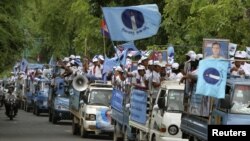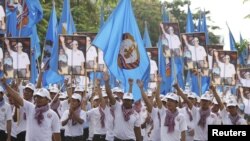PHNOM PENH - Cambodians vote Sunday in elections for their local commune councils. In a country where the prime minister, Hun Sen, maintains a tight grip on power, opposition parties are trying to be realistic about the outcome.
For opposition lawmaker Son Chhay, the local commune elections are all about lowered expectations. He is an official for the Sam Rainsy Party, but he has no grand illusions of victory on Sunday.
"When we talk about winning, it's something that is not going to be easy," Chhay said. "Currently we're only head of 28 communes, out of 1,633. So it's very small. So we're hoping we're going to get at least 10 percent of this. This could be a very good start."
It's a good start, but these are still modest goals for what is Cambodia's largest opposition party. In a country where the ruling Cambodian People's Party, known as the CPP, has maintained a grip on power since the 1990s, opposing the government at the polls has always been a struggle.
This year is no different.
For the past two weeks, the political parties have been running street campaigns throughout the country. In Phnom Penh, long, boisterous convoys promoting the CPP rumble through busy intersections, blaring campaign messages.
In contrast, the Sam Rainsy Party, or SRP, has a more modest fleet.
The party has rigged large projection screens on a handful of trucks, which are driven around the city during the evenings. The screens show videos of Cambodian villagers being evicted from their lands. With most of the country's radio and television airwaves sympathetic to the government, Chhay says this is the best opposition parties can do to get out the message.
"Normally this kind of situation would probably be shown on the television news. But not in Cambodia. We do not have access to information so the government only presents the kind of propaganda news to the public," Chhay said.
Election observers say the CPP's control also extends to civil servants, police and the military. By law, these groups are prohibited from using their influence to campaign for or against any political party. But in reality, the rules are ignored.
The misuse of state resources has become a systematic problem, said Koul Panha, the executive director of the Committee for Free and Fair Elections in Cambodia, or COMFREL.
"The ruling party tries to organize, to use, encourage and mobilize the state officials. They mobilize them, they go to the field, to conduct activities to support the ruling party," Panha said. "Sometimes this includes opposition to other people also. This happens since before, but now in this election it has increased. It's systematic. And it violates the law."
However, Panha says this campaign period has seen some improvements over previous elections. There have been fewer complaints of intimidation, threats or other irregularities. And there have been fewer cases of political violence.
"Cambodian elections have not reached the international standard for free and fair, yet," noted Panha, adding that the process remains flawed.
Despite lots of campaigning, some observers say this commune election has been short on actual policy debate. Instead, parties have been using the opportunity to promote their brand names, said political analyst Lao Mong Hay.
"It seems that they, candidates, have not concentrated on local issues. It seems that they just talk about national issues and the political platform of the party. It's more like the general election, not like local elections," Hay said. "But I doubt whether candidates can grasp the local issues very well, because they can do very little when they are controlled by the top."
Back at the SRP offices in Phnom Penh, parliamentarian Son Chhay says getting a foothold at the commune level is important. But his party is already looking beyond Sunday's vote, and ahead to next year's general election.
"Local election is a stepping stone to the national election," Chhay said. "When we have more control over the local governments, then you're able to have more resources, more people working for you to promote the party when it comes to next year's election."
Those elections are now scheduled for July 2013.
For opposition lawmaker Son Chhay, the local commune elections are all about lowered expectations. He is an official for the Sam Rainsy Party, but he has no grand illusions of victory on Sunday.
"When we talk about winning, it's something that is not going to be easy," Chhay said. "Currently we're only head of 28 communes, out of 1,633. So it's very small. So we're hoping we're going to get at least 10 percent of this. This could be a very good start."
It's a good start, but these are still modest goals for what is Cambodia's largest opposition party. In a country where the ruling Cambodian People's Party, known as the CPP, has maintained a grip on power since the 1990s, opposing the government at the polls has always been a struggle.
This year is no different.
For the past two weeks, the political parties have been running street campaigns throughout the country. In Phnom Penh, long, boisterous convoys promoting the CPP rumble through busy intersections, blaring campaign messages.
In contrast, the Sam Rainsy Party, or SRP, has a more modest fleet.
The party has rigged large projection screens on a handful of trucks, which are driven around the city during the evenings. The screens show videos of Cambodian villagers being evicted from their lands. With most of the country's radio and television airwaves sympathetic to the government, Chhay says this is the best opposition parties can do to get out the message.
"Normally this kind of situation would probably be shown on the television news. But not in Cambodia. We do not have access to information so the government only presents the kind of propaganda news to the public," Chhay said.
Election observers say the CPP's control also extends to civil servants, police and the military. By law, these groups are prohibited from using their influence to campaign for or against any political party. But in reality, the rules are ignored.
The misuse of state resources has become a systematic problem, said Koul Panha, the executive director of the Committee for Free and Fair Elections in Cambodia, or COMFREL.
"The ruling party tries to organize, to use, encourage and mobilize the state officials. They mobilize them, they go to the field, to conduct activities to support the ruling party," Panha said. "Sometimes this includes opposition to other people also. This happens since before, but now in this election it has increased. It's systematic. And it violates the law."
However, Panha says this campaign period has seen some improvements over previous elections. There have been fewer complaints of intimidation, threats or other irregularities. And there have been fewer cases of political violence.
"Cambodian elections have not reached the international standard for free and fair, yet," noted Panha, adding that the process remains flawed.
Despite lots of campaigning, some observers say this commune election has been short on actual policy debate. Instead, parties have been using the opportunity to promote their brand names, said political analyst Lao Mong Hay.
"It seems that they, candidates, have not concentrated on local issues. It seems that they just talk about national issues and the political platform of the party. It's more like the general election, not like local elections," Hay said. "But I doubt whether candidates can grasp the local issues very well, because they can do very little when they are controlled by the top."
Back at the SRP offices in Phnom Penh, parliamentarian Son Chhay says getting a foothold at the commune level is important. But his party is already looking beyond Sunday's vote, and ahead to next year's general election.
"Local election is a stepping stone to the national election," Chhay said. "When we have more control over the local governments, then you're able to have more resources, more people working for you to promote the party when it comes to next year's election."
Those elections are now scheduled for July 2013.





